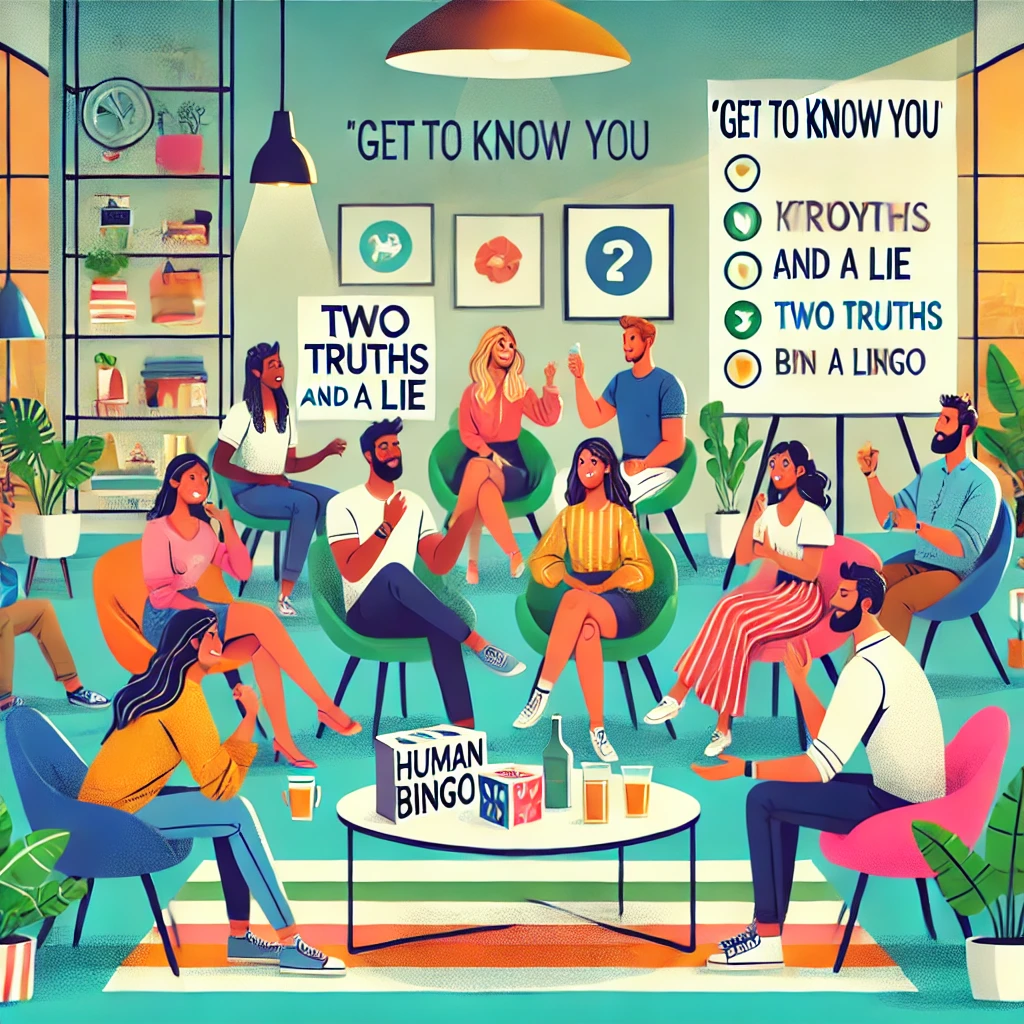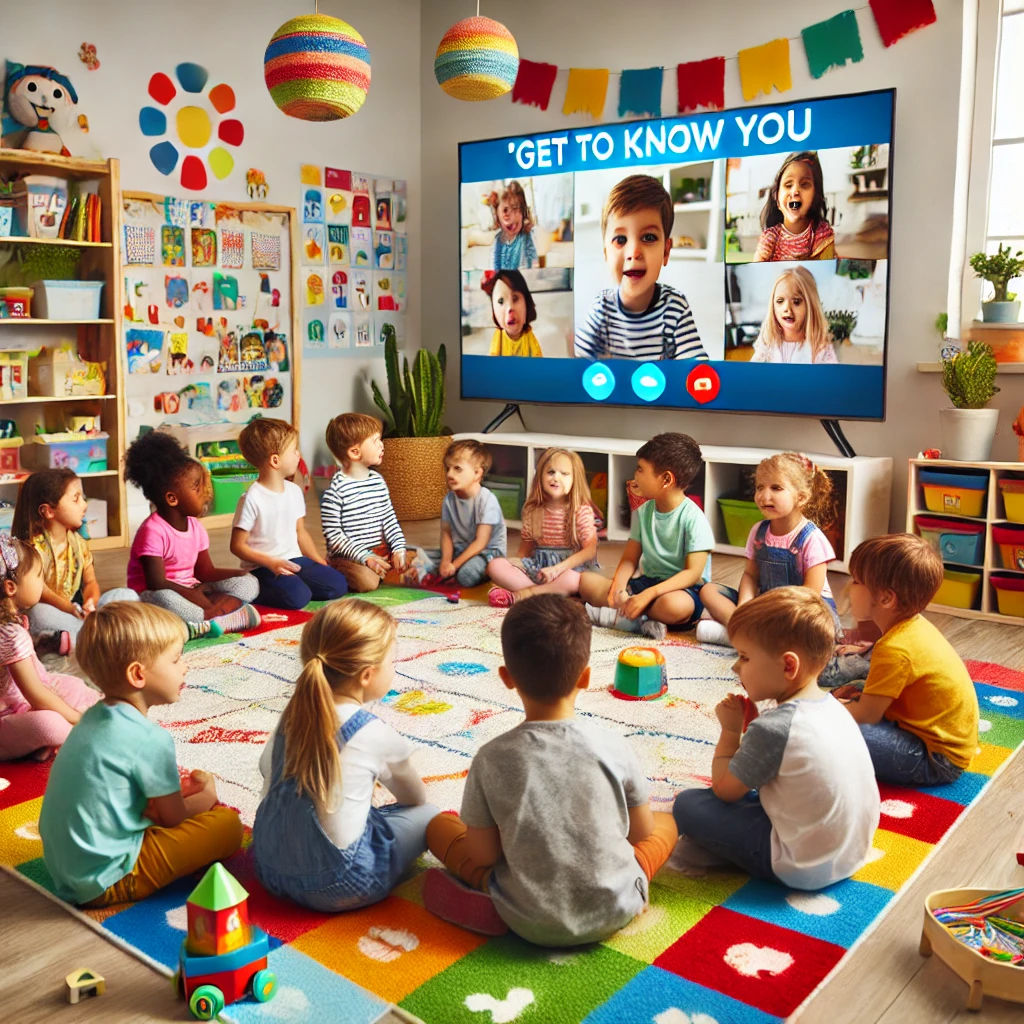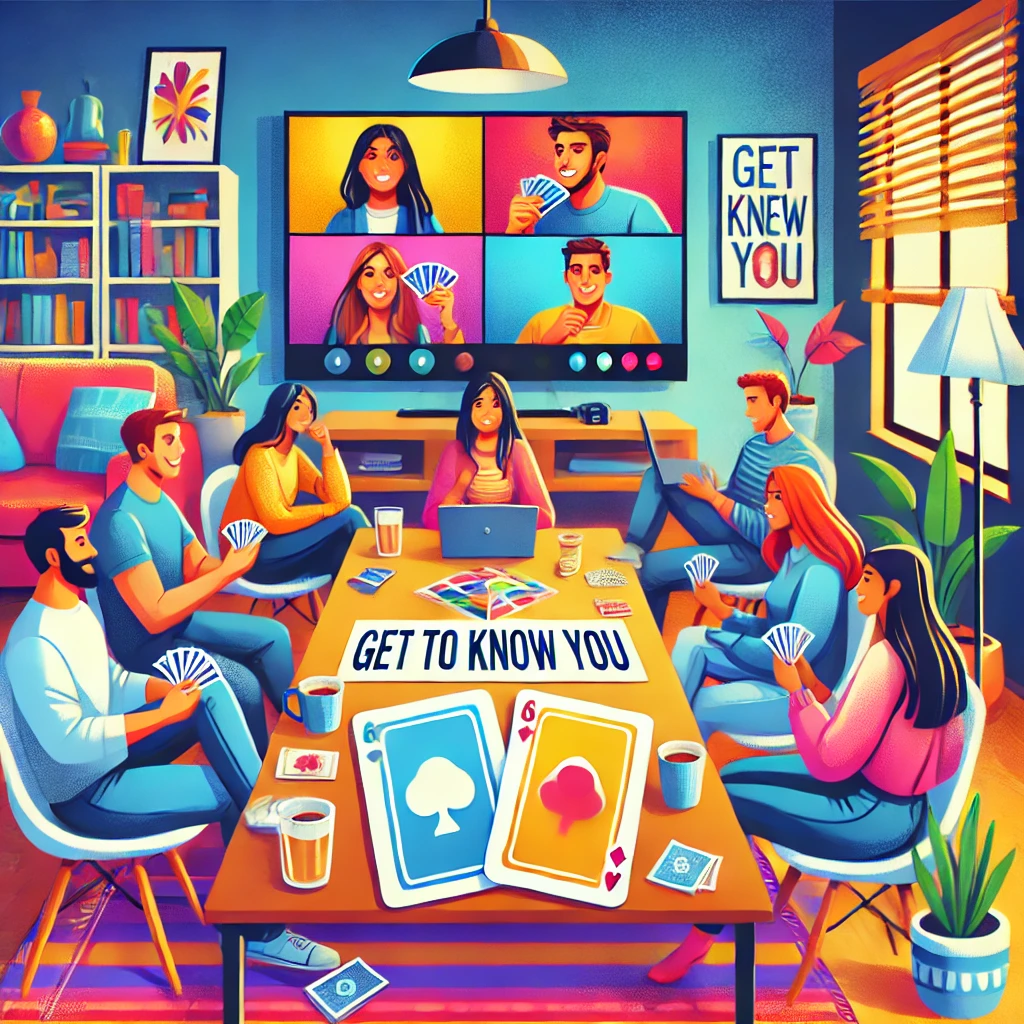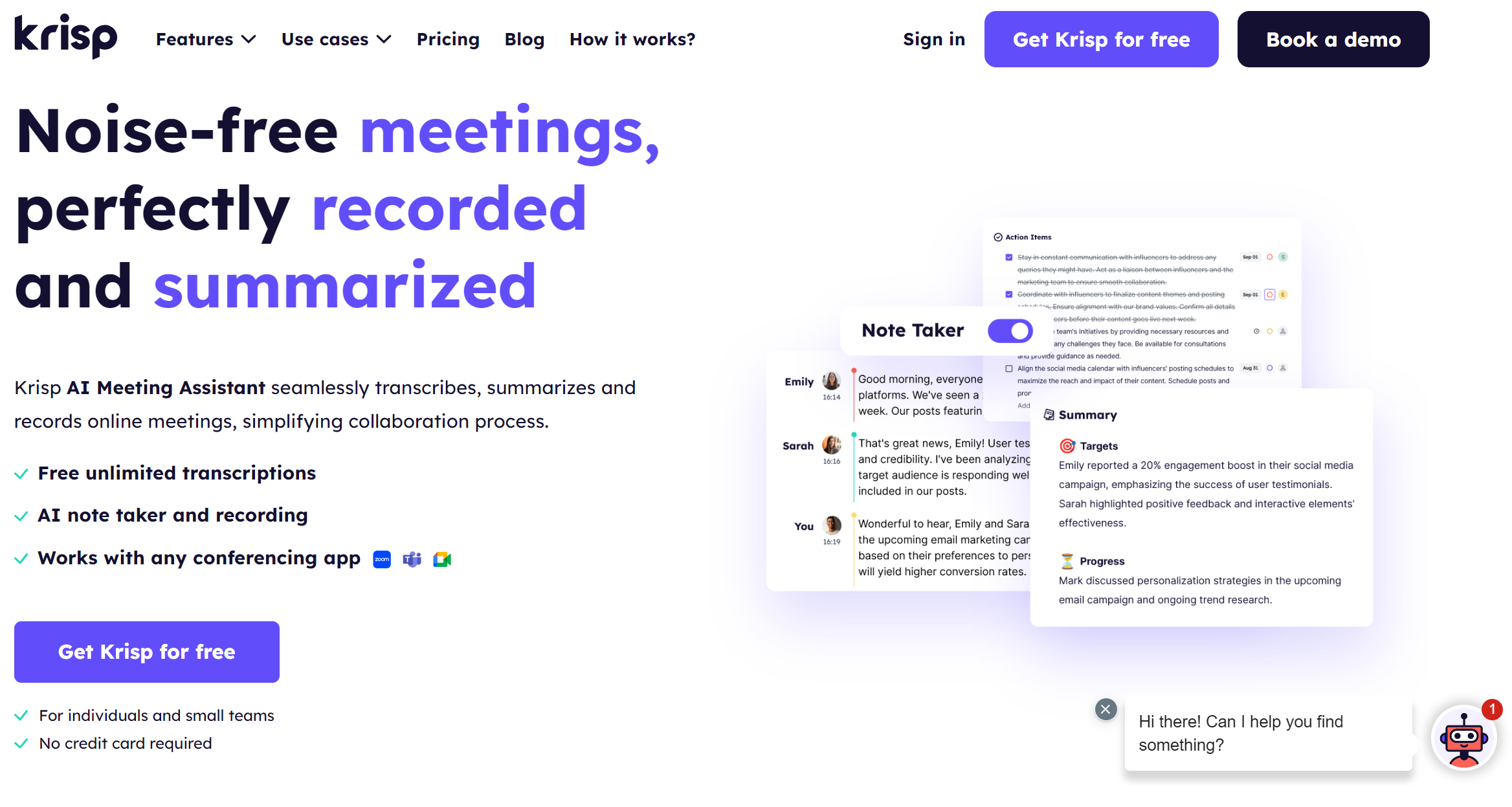Imagine you’re in a room full of strangers, wishing for a fun and easy way to break the ice. Good “get to know you” games are your ticket to turning awkward silence into lively chatter, whether at a party, in a classroom, or on a virtual call.
These games are entertaining and incredibly effective at helping people open up, share a laugh, and form connections. Ready to learn “What are good get to know you games?”
Let’s explore the best “get to know you” games you can use in different groups to make any gathering a blast. Moreover, let’s unveil how Meeting Assistant Krisp dramatically enhances virtual meetings through unmatched Noise Cancellation and exceptionally accurate Note-Taking.
What Are “Get to Know You” Games?

“Get to know you” (GTKY) games are playful activities that help people discover more about each other in a fun and engaging way. Examples include “Two Truths and a Lie” and “Would You Rather?”
These games break the ice, fostering an environment where everyone feels at ease and welcomed. They help build connections and foster a sense of camaraderie among participants.
What Is a “Getting to Know You” Activity?
Wondering what to do during a GTKY so that everyone feels comfortable? Participants actively engage in collaborative activities and fun challenges during “get to know you” sessions.
These can include virtual ice breakers and team-building games with interesting personality tests and ice breaker questions.
Why Use Ice Breaker Games?
Techopedia’s HR statistics show that only 32% of employees report workplace engagement. Additionally, 18% are disengaged and unhappy at work, up 4% since 2020. The good news is that “get to know you” games can keep members engaged. How?
- GTKY activities encourage participants to share personal stories, listen attentively, find common interests, and get better acquainted.
- Moreover, “get to know you” sessions help participants quickly feel comfortable with one another and build common ground.
- Also, they create positive emotions and build memories that participants can talk and laugh about in the future.
- “Get to know you” games boost group motivation and apprehension and create positive energy for productive discussions and idea sharing.
- Additionally, these activities encourage creative and innovative thinking toward problem-solving.
- As a result, GTKY activities boost team morale, strengthen connections, and create a welcoming and friendly atmosphere, turning awkward moments into memorable interactions.
Let’s get started.
Good “Get to Know You” Games for Adults
 What are good ice breakers “get to know you” for adults? Here are five examples:
What are good ice breakers “get to know you” for adults? Here are five examples:
-
Never Have I Ever
- Players take turns saying something they’ve never done, starting with “Never have I ever…”
- They do this and put down a finger.
- The game continues until someone has all their fingers down, making it fun and revealing.
Example: “Never have I ever gone skydiving.” Those who have gone skydiving put down a finger.
-
Personality Bingo
- Each player gets a bingo card with personality traits or experiences in each square.
- Players mingle, trying to find someone who matches each trait to fill out their cards.
- “Get to know you” games like this help players learn unique facts about each other.
Example: Participants try to find someone who “has traveled to three continents” to mark off a square.
-
Desert Island
- Players discuss three items they would bring if stranded on a desert island.
- It often leads to interesting debates and creative thinking about priorities.
- This game reveals personal preferences and survival instincts.
Example: A participant may choose a water purifier, a multi-tool, and a survival guidebook.
-
Jenga Questions
- Write questions on Jenga blocks, such as:
– “Which one skill do you wish you had and why?”
– “Describe a memorable experience from childhood”
– “What is your favorite book/movie, and why did it impact you?”
- Players pull out a block and answer the question on it.
- It’s fun to combine physical skills with getting to know others.
Example: A participant pulls out a block with the question, “What’s your favorite childhood memory?” and shares the answer.
-
Team Trivia
- Players form teams and answer trivia questions, such as:
– What is the smallest country in the world by land area?
– Who painted the Mona Lisa?
– What is the capital of Japan?
- Questions can range from general to specific topics.
- This “get to know you” game fosters teamwork and competitive spirit.
Example: Participants should answer, “What is the capital of Armenia?” (The Answer is Yerevan).
Ice Breakers for Kids
What is a “getting to know you” activity for kids? Here are five options:
-
Simon Says
- Players must follow commands given by the leader, “Simon,” only if the command starts with “Simon says.”
- If “Simon” doesn’t say “Simon says,” and a player follows the command, they’re out.
- “Get to know you” games like this test listening skills and attention to detail.
Example: “Simon says touch your nose.” Players who touch their noses stay in the game.
-
Freeze Dance
- Players dance while the music plays and must freeze when it’s silent.
- No one must move in silence; otherwise, they will be out.
- This game encourages movement and listening skills.
Example: Players freeze mid-dance when the music suddenly stops.
-
Color Hunt
- Players are given a color and must find items of that color within a time limit.
- The player who finds the most items of the given color wins.
- “Get to know you” games like this encourage observation skills.
Example: Find as many red items as you can in two minutes.
-
Red Light, Green Light
- Players move forward when “green light” is called and must stop when “red light” is called.
- Anyone moving during the “red light” must return to the starting line.
- The first member reaching the caller wins.
Example: The caller says, “green light,” and the players move, then “red light,” and they must stop instantly.
-
Follow the Leader
- One player is the leader, and others must mimic their actions.
- The leader can make movements or gestures, and followers must copy exactly.
- “Get to know you” games like this encourage coordination and attention to detail.
Example: The leader hops on one foot, and everyone else must hop on one foot, too.
Fun “Get to Know You” Games
How to “get to know” someone in a fun way? Here are five games:
-
Telephone
- Players sit in a circle, and one person whispers a message to the next person.
- The message is passed around the circle by whispering, and the last person says it out loud.
- The fun part is seeing how much the message has changed from start to finish.
Example: The starting message is, “The cat wore a blue hat.” The final message is, “The bat wore a new mat.”
-
Scavenger Hunt
- Players are given a list of items to find or tasks to complete based on clues.
- The first player or team to find all the items or complete all tasks wins.
- “Get to know you” games like this encourage teamwork and problem-solving.
Example: Clue: “Find something that can take you far.” Item: A toy car.
-
Photo Caption Contest
- Players are shown random photos and must write funny or creative captions for them.
- The group votes on the best or funniest caption.
- This game encourages creativity and humor.
Example: A photo of a cat in sunglasses. The caption is: “Just another day in the life of a cool cat.”
-
Emoji Stories
- Players tell a story using only emojis, and others try to interpret the story.
- It can be played in person or virtually using a messaging app.
- This game encourages creativity and understanding of non-verbal communication
Example: 🏝️🧳✈️🍹🌅 (A vacation story involving a beach, luggage, a flight, a swimsuit, a cocktail, and a sunset.)
-
Talent Show
- Players take turns showcasing their hidden talents, such as singing, dancing, magic tricks, or playing an instrument.
- The group can vote for the best talent or enjoy the performances.
- “Get to know you” games like this discover unique abilities and build confidence.
Example: A participant performs a magic trick by making a coin disappear and reappear.
Virtual “Get to Know You” Games

Getting to know you” session? Here are five games to play during online gatherings. Use the Krisp AI Meeting Assistant to enhance your session through Noise Cancellation and accurate Note-Taking.
-
Virtual Scavenger Hunt
- Players receive a list of items to find around their house based on specific prompts.
- This game can be played via video call. Participants have a set time to find and show the items on camera.
- It encourages quick thinking and creativity.
Example: Prompt: “Find something blue and round.” Players might show a blue ball or a blue mug.
-
Zoom Icebreakers
- Participants join breakout rooms during a Zoom call and ask each other ice breaker questions.
- Questions can range from fun and light-hearted to more thoughtful and profound.
- “Get to know you” games like this help smaller groups interact more intimately, fostering better connections.
Example: The icebreaker question is, “If you could have dinner with any historical figure, who would it be and why?”
-
Two Truths and a Lie
- Each participant shares two factual statements and one false statement about themselves.
- Others guess which statement is a lie, sparking fun and revealing conversations.
- This game helps people learn exciting facts about each other.
Example: Statements like, “I’ve climbed Mount Everest, I speak three languages, I’ve never been on an airplane.” The lie might be, “I’ve climbed Mount Everest.”
-
Online Karaoke
- Participants take turns singing their favorite songs over a video call.
- Everyone can showcase their singing skills using a karaoke app or YouTube videos with lyrics.
- “Get to know you” games like this are fun, entertaining, and a great way to bond over music.
Example: A participant sings “Stand by Me” by Ben E. King during the virtual karaoke session.
-
Digital Storytelling
- Participants create and share stories using multimedia tools like PowerPoint, video clips, or digital collages.
- Stories can be personal anecdotes, fictional tales, or even collaborative creations.
- This game encourages creativity and technical skills.
Example: A participant shares a digital story about their recent vacation, using photos, videos, and music to enhance the narrative.
“Get to Know You” Games for Teens
What is “getting to know you” for teens? Here are five games:
-
Truth or Dare
- Players can either answer a truth question or perform a dare.
- Truth questions often reveal personal insights, while dares encourage fun and sometimes silly activities.
- This game is excellent for breaking the ice and getting people to open up or step out of their comfort zones.
Example: Truth: “What is your biggest fear?” Dare: “Cite your favorite quote loudly.”
-
Capture the Flag
- Players are divided into two teams, each with a flag placed in their territory.
- They must aim to get the competitor’s flag and bring it back to their base without being tagged.
- “Get to know you” games like this involve strategy, teamwork, and physical activity.
Example: One team devises a plan in which half distracts the opponents while the others sneak in to capture the flag.
-
Snapchat Challenges
- Participants complete fun challenges using Snapchat, such as creating specific types of snaps or using certain filters.
- Challenges can be creative, silly, or competitive and are shared within the group for everyone to see.
- This game leverages the interactive features of Snapchat to engage participants.
Example: Challenge: “Use the dog filter to create a snap of you doing a funny dance.”
-
Selfie Scavenger Hunt
- Players receive a list of items or locations and must take selfies with each one within a specific time frame.
- This game combines the fun of selfies with the excitement of a scavenger hunt.
- “Get to know you” games like this are a great way to explore surroundings and be creative with photo angles.
Example: Take a selfie with a statue, a tree with colorful leaves, and a sign with your city’s name.
-
Meme Creation
- Participants create memes using images and captions, often about each other or the current situation.
- Memes are shared with the group; everyone can vote on the funniest or most creative.
- This game encourages humor and creativity, often resulting in lots of laughs.
Example: Create a meme using a funny photo from a recent group event, captioned with an inside joke.
“Get to Know You” Games for Students
What is GTKY activity for students? Consider these options:
-
Classmate Bingo
- Players receive bingo cards with traits or experiences written in each square.
- The goal is to find classmates who match the traits and fill in the squares.
- The winner is the participant who completes a row, column, or diagonal and shouts “Bingo!” first.
Example: A bingo square might say, “Has a pet dog.” Players find someone who fits this description and write their name in the square.
-
The Question Ball
- Questions are written on a beach ball, and players toss the ball to each other.
- When players catch the ball, they answer the question closest to their right thumb.
- “Get to know you” games like this are great for sparking conversations and learning more about each other.
Example: A question on the ball might be, “What is your favorite movie?” The player catching the ball would then answer this question.
-
Show and Tell
- Players bring an interesting item and share the story or significance behind it.
- This game encourages public speaking and sharing personal experiences.
- It helps classmates learn more about each other’s interests and backgrounds.
Example: A student brings a seashell they found on a family vacation and explains why it’s unique to them.
-
Interview a Classmate
- Players pair up and take turns interviewing each other with questions.
- After the interviews, each player introduces their partner to the group, sharing interesting facts they learned.
- “Get to know you” games like this help build communication skills and foster connections between classmates.
Example: One question might be, “What is your favorite hobby?” The interviewer notes the answer and later shares it with the group.
-
Guess Who?
- Players write down clues about themselves on paper, then mix up and draw them individually.
- The group tries to guess which classmate matches the clues.
- This game is excellent for learning unique facts about each other in a fun and interactive way.
Example: The clue is, “I have traveled to three different countries.” The group guesses who fits this description.
“Get to Know You” Card Games

What is a GTKY session for card games? Here are five examples:
-
UNO
- Participants pair cards from their hands based on matching colors or numbers with the top card on the discard pile.
- Unique cards (like Draw Two, Skip, or Reverse) add fun twists to the game.
- To make it an icebreaker, each time a player draws a specific card (e.g., Wild), they share a fun fact about themselves.
Example: Drawing a Wild card and sharing, “I once went skydiving in Switzerland.”
-
Go Fish
- Players ask each other for cards to complete pairs or sets, aiming to collect the most sets.
- When a player asks for a card, they also ask a related question, making it an engaging conversation starter.
- “Get to know you” games like this combine the fun of card matching with getting to know each other better.
Example: Asking for a card, “Do you have any threes? Also, what’s your favorite vacation spot?”
3. Apples to Apples
- Players act as the judge picking a green adjective card. The other players choose the best red noun card from their hands that matches the adjective.
- The judge picks the funniest or most fitting noun card as the winner.
- This game inspires creativity and laughter with funny or unexpected matches.
Example: Matching “hilarious” with “grandma’s dancing.”
-
Exploding Kittens
- Players take turns drawing cards. They must only draw an Exploding Kitten card to stay in the game if they have a Defuse card.
- When players lose, they answer a fun question before leaving the game, keeping their engagement high.
- “Get to know you” games like this mixe strategy with humor and interaction.
Example: Drawing an Exploding Kitten card and answering, “What’s your most embarrassing moment?”
-
Phase 10
- Players work through ten phases of card combinations, like sets, runs, or a certain number of cards of one color.
- Each time players complete a phase, they share something about themselves, adding a personal touch to the game.
- This game combines strategic card play with personal sharing.
Example: Completing a phase and sharing, “I have a collection of over 100 postcards from around the world.”
No Prep “Get to Know You” Games
What is a “getting to know you” activity without preparation? Here are five games that you can easily use for teams with people with diverse work styles:
-
20 Questions
- A participant thinks of an object. The others try to guess it by asking yes/no questions.
- The game continues until 20 questions are asked or the object is guessed correctly.
- This game encourages critical thinking and deduction.
Example: The object is a “pineapple.” Players might ask, “Is it a fruit?” “Is it yellow?” until someone correctly guesses it.
-
Memory Game
- Players take turns naming items in a list, with each person repeating the previous items and adding a new one.
- The game tests and enhances memory skills, as players must recall an increasingly long list of items.
- The player who forgets an item or repeats it incorrectly is out.
Example: The list starts with “apple,” the next player says “apple, banana,” and it continues with “apple, banana, carrot,” etc.
-
Rock, Paper, Scissors
- Players simultaneously form one of three shapes with their hands: rock, paper, or scissors.
- Rock wins scissors, scissors wins paper, and paper wins rock. The loser shares a fact about themselves.
- “Get to know you” games like this are quick and easy and add a fun twist with personal sharing.
Example: After losing with scissors against the rock, the player says, “I love hiking in the mountains.”
-
Guess the Sound
- One player makes a sound, and the others try to identify it.
- Sounds can be made using objects, instruments, or just vocal effects.
- This game is great for auditory recognition and creativity.
Example: A player mimics a cow’s “moo,” and others guess it’s a cow.
-
Human Knot
- Players stand in a circle. Then, they reach across to grab hands with different people, creating a “knot.”
- Without letting go, they must work together to untangle themselves into a circle again.
- This game promotes teamwork, communication, and problem-solving.
Example: After several minutes of twisting and turning, the group finally untangles into a complete circle without breaking any handholds.
“Get to Know You” Games for Work
What are good “get to know you” games for work that you can also use during team gatherings like post mortem meetings and sales meetings? Consider these:
-
Office Bingo
- Players receive bingo cards with office-related prompts or tasks in each square.
- The goal is to complete the tasks and mark off the squares, aiming for a bingo (a row, column, or diagonal).
- This game encourages interaction and exploration of the workplace.
Example: A bingo square might say, “Introduce yourself to someone from another department.” Players find and introduce themselves to a colleague they haven’t met.
-
Job Shadowing
- Participants shadow a colleague in a different role for a day to learn about their daily tasks and responsibilities.
- This experience helps employees understand different aspects of the company and fosters cross-departmental relationships.
- “Get to know you” games like this are an insightful way to gain new perspectives and skills.
Example: A marketing employee shadows a sales representative for a day to learn about the sales process and client interactions.
-
Lunch Roulette
- Employees are randomly paired up for lunch to encourage mingling and networking across different departments or teams.
- This game promotes camaraderie.
- Participants get to know colleagues they might only interact with occasionally.
Example: An IT specialist and an HR manager are paired for lunch, leading to a discussion about improving employee onboarding processes.
-
Department Swap
- Employees spend a day working in a different department to understand the roles and challenges of their colleagues.
- “Get to know you” games like this encourage empathy, collaboration, and a better understanding of the company’s operations.
- Participants gain hands-on experience and new insights.
Example: A finance team member spends a day in the customer service department, learning about customer interactions and support processes.
-
Company History Quiz
- Employees participate in a quiz that tests their knowledge of the company’s history, milestones, and key achievements.
- This game fosters a sense of pride and belonging, helping employees feel more connected to the company.
- It can be conducted individually or in teams for a competitive element.
Example: A quiz question might be, “In what year was the company founded?” with multiple-choice answers, and employees compete to see who knows the most about their workplace.
“Get to Know You” Games for Couples

What is “getting to know you” for couples? Here are several options:
-
Love Maps
- Couples ask each other detailed questions about their lives, preferences, and histories to deepen their understanding of one another.
- Questions can cover various topics, including childhood memories, favorite hobbies, and future dreams.
- This game helps build emotional intimacy and strengthen relationships.
Example: “What was your favorite childhood vacation, and why?”
-
The Newlywed Game
- Participants ask each other questions concerning their personalities to discover the level of compatibility.
- Questions range from personal preferences to details about their relationship.
- “Get to know you” games like this are a fun way to test knowledge and learn more about each other.
Example: “What is your partner’s favorite meal?” Each person writes down their answer, which they compare to see if they match.
-
Bucket List
- Couples create and share their bucket lists, detailing the experiences and goals they wish to achieve in their lifetime.
- This game encourages open communication about dreams and aspirations, fostering mutual support.
- Sharing bucket lists can also lead to planning future adventures together.
Example: “Travel to Japan during cherry blossom season” might be on one partner’s bucket list, and discussing it could lead to making travel plans together.
-
Memory Lane
- Couples share their favorite memories from their time together, reflecting on significant moments in their relationship.
- This game strengthens bonds by reminiscing about shared experiences and happy times.
- “Get to know you” games like this help couples appreciate the journey they have been on together.
Example: “Remember our first trip to the beach and how we watched the sunset together?”
-
Storytelling
- Partners tell stories from their past that others might not know, revealing more about their history and experiences.
- “Get to know you” games like this promote profound understanding and empathy by sharing meaningful or amusing anecdotes.
- It can be a delightful way to learn new things about each other.
Example: “Once, in high school, I accidentally signed up for a cooking class, thinking it was an art class, but I ended up loving it and learning how to bake.”
Group “Get to Know You” Games
What is GTKY activity for groups? Here are ice breakers to consider for groups, including those gathering during an all hands meeting:
-
Human Bingo
- Players receive bingo cards with various traits or experiences written in each square.
- The objective is to find people who match the traits and have them sign the corresponding square.
- The winner is the one who completes a row, column, or diagonal first.
Example: A bingo square might say, “Has visited more than three countries.” Players find someone who fits this description and get their signature.
-
Speed Networking
- Participants have timed conversations with each other, usually lasting from three to five minutes, before moving to the next person.
- This format allows everyone to meet many people in a short amount of time.
- “Get to know you” games like this effectively build connections and quickly gather initial impressions.
Example: In a five-minute conversation, participants might ask, “What inspired you to join this industry?” before moving to the next person.
-
The Matching Game
- Players write down fun facts about themselves on slips of paper, which are then mixed up and distributed.
- Each person reads a fun fact and tries to match it to the correct individual.
- This game encourages learning unique and exciting details about others.
Example: A fun fact could be, “I once bungee-jumped off a bridge,” and participants guess who it belongs to.
-
Common Ground
- Participants mingle and find shared interests or experiences with each other.
- The goal is to discover as many commonalities as possible in a set time.
- “Get to know you” games like this foster connection based on shared hobbies, experiences, or preferences.
Example: Two people might discover they love hiking and have visited the same national park.
-
Pictionary
- Players draw a word or phrase on a whiteboard or paper while others try to guess it.
- The drawer cannot speak or use letters or numbers.
- This game encourages creativity and teamwork while being highly engaging and fun.
Example: The prompt might be “bicycle,” the drawer sketches a bike while others guess until someone gets it right.
Quick “Get to Know You” Games
What is a GTKY session for quick ice breakers? Here are five examples to try during quick gatherings, including a kick off meeting:
-
20 Questions
- A participant thinks of an object. The others try to guess it through yes/no questions.
- The game continues until 20 questions are asked or the object is guessed correctly.
- This game encourages critical thinking and deduction.
Example: The object is a “book.” Players ask questions like, “Is it abstract?” and “Is it edible?” until they guess correctly.
-
Word Association
- Participants say the first word that comes to mind associated with the previous word.
- This game can continue indefinitely or until a player hesitates or repeats a word.
- “Get to know you” games like this are a great way to spark creativity and quick thinking.
Example: If the word is “sun,” the next player might say “beach,” followed by “sand,” “castle,” and so on.
-
Memory Game
- Players take turns naming items in a list, with each person repeating the previous items and adding a new one.
- This game tests and enhances memory skills, as players must recall an increasingly long list of items.
- The player who forgets an item or repeats it incorrectly is out.
Example: The list starts with “apple,” the next player says “apple, banana,” and it continues with “apple, banana, carrot,” etc.
-
Impromptu Speeches
- Participants give short, spontaneous speeches on random topics drawn from a hat or assigned by a leader.
- This game builds public speaking skills and quick thinking.
- Learning about each other’s interests and communication styles is fun.
Example: A topic might be “The importance of laughter,” and the speaker has one minute to deliver an impromptu speech.
-
Hot Seat
- A player sits in the “hot seat” to answer rapid-fire questions from the group.
- Questions can refer to personal preferences and hypothetical scenarios.
- This GTKY game is excellent for getting to know someone quickly and fostering openness.
Example: Questions might include, “What’s your favorite book?” “If you could travel anywhere, where would you go?” and “What’s your dream job?”
Easy “Get to Know You” Games
What is an easy “getting to know you” activity? Here are several examples that you can also consider for welcome-to-the-team activities:
-
The Name Game
- Participants introduce themselves with a fun twist, like adding an adjective that starts with the same letter as their name.
- The game continues with each person repeating the previous names and their adjectives.
- This helps with memorizing names in a fun and interactive way.
Example: “I’m Joyful Jane,” followed by the next person saying, “This is Joyful Jane, and I’m Creative Chris.”
-
The Question Jar
- Participants pull random questions from a jar and answer them in turn.
- Questions can range from light-hearted to deep, sparking interesting conversations.
- The organizer can customize this game to fit the group’s dynamics.
Example: A question might be, “What is your favorite book and why?” The participant shares their answer with the group.
-
Alphabet Introductions
- Participants use an object that starts with the first letter of their names to introduce themselves.
- “Get to know you” games like this help people remember names through alliteration and creativity.
- It’s a simple yet effective icebreaker for learning names and traits.
Example: “I’m Joyful Jane” or “I’m Artistic Alice.”
-
Pass the Ball
- Participants sit in a circle and throw a ball that they must catch to answer a question.
- Questions can be pre-determined or spontaneous, adding an element of surprise.
- This game encourages interaction and keeps everyone engaged.
Example: Catching the ball and answering, “What’s your favorite hobby?”
-
First Impressions
- Participants share their initial thoughts or impressions about each person in the group.
- “Get to know you” games like this can be done verbally or written on cards to be read aloud.
- This ice breaker game promotes discussions about perceptions and realities.
Example: “My first impression of John was that he seems approachable and friendly.”
“Get to Know You” Board Games

What are good “get to know you” games for board meetings? Consider these options:
-
Guess Who?
- Through yes/no questions, participants try to determine the character their opponent has selected from a lineup of faces.
- The goal is to deduce the opponent’s character by the process of elimination.
- This game enhances deductive reasoning and attention to detail.
Example: A participant asks, “Does your character wear glasses?” and, based on the response, eliminates all characters without glasses.
-
Codenames
- Players are divided into two teams. Each team has a spymaster who gives clues using only one so the members can guess the correct words on the board.
- The clues relate to the words in terms of meaning or association without directly naming them.
- The team must guess all their words correctly while avoiding the opponent’s words and the assassin.
Example: Spymaster says “Ocean” to hint at the words “Wave” and “Fish” on the board.
-
The Game of Things
- Players write responses to a prompt, and one player reads them out loud. The group then guesses who wrote each response.
- “Get to know you” games like this reveal players’ creativity and sense of humor while encouraging interaction.
- It’s a fun way to learn more about each other’s thoughts and personalities.
Example: Prompt: “Things you shouldn’t do at a party.” Responses might include “Start a food fight” or “Tell embarrassing stories about the host.”
-
Scattergories
- Participants receive a list of categories. Then, they create items that fit each category, starting with a specific letter.
- Those who give unique answers no one else has thought of getting points.
- This game encourages quick thinking and creativity.
Example: The letter “B” for categories like “Fruits” (Orange), “Cities” (Boston), and “Animals” (Bear).
-
Taboo
- Players describe a word to their teammates without using the word itself or any of the taboo words listed on the card.
- The goal is to get the team to guess the word before time runs out without saying any forbidden words.
- This game enhances vocabulary and communication skills.
Example: Describing “Birthday” without saying “Party,” “Cake,” “Presents,” or “Celebrate.” The player might say, “A special day each year when you turn a year older.”
“Get to Know You” Games for Small Groups
What is a “getting to know you” activity for small teams? Here are five options to consider for small groups like those gathering during a standing meeting or a touchpoint meeting:
-
Two Truths and a Lie
- Each participant shares three statements about themselves: two true and one false.
- The other members guess which statement is the lie.
- This game encourages sharing personal stories and fun facts, revealing exciting details about each other.
Example: “I have climbed Mount Everest, I speak five languages, and I’ve never eaten sushi.” The lie might be: “I have climbed Mount Everest.”
-
Human Knot
- Standing in a circle, players reach across to grab hands with different people, creating a tangled “knot.”
- Without letting go, they must work together to untangle into a circle again.
- “Get to know you” games like this promote teamwork, communication, and problem-solving.
Example: After several minutes of strategic twisting and turning, the group finally untangles into a complete circle without breaking any handholds.
-
Alphabet Introductions
- Participants use the same letter as their names to introduce themselves.
- This game helps people remember names through alliteration and creativity.
- It’s a simple yet effective icebreaker for learning names and traits.
Example: “I’m Creative Cathy,” or “I’m Jolly John.”
-
Impromptu Speeches
- Participants give short, spontaneous speeches on random topics drawn from a hat or assigned by a leader.
- “Get to know you” games like this build public speaking skills and quick thinking.
- It’s fun to learn about each other’s interests and communication styles.
Example: A topic might be “The importance of laughter,” and the speaker has one minute to deliver an impromptu speech.
-
The Question Jar
- Participants pull random questions from a jar and answer them.
- Questions can range from light-hearted to deep, sparking interesting conversations.
- The organizer can tailor this game to fit the group’s dynamics.
Example: A question might be, “What is your favorite childhood memory?” Then, the participant shares their answer with the group.
“Get to Know You” Games for Large Groups
Here are good “get to know you” games for large team gatherings, including human resource meetings:
-
The Matching Game
- Players write down fun facts about themselves on slips of paper, which are then mixed up and distributed.
- Each person reads a fun fact and tries to match it to the correct individual.
- This game encourages learning unique and exciting details about others.
Example: A fun fact might be, “I once met a famous movie star.” Players guess who wrote it.
-
Common Ground
- Participants mingle and find shared interests or experiences with each other.
- The goal is to discover as many commonalities as possible in a set time.
- This game fosters connections based on shared hobbies, experiences, or preferences.
Example: Two people might discover they enjoy hiking and have visited the same national park.
-
Two Truths and a Lie
- Each participant shares three statements about themselves: two true and one false.
- The other members guess which statement is the lie.
- “Get to know you” games like this encourage sharing personal stories and fun facts, revealing exciting details about each other.
Example: “I have climbed Mount Everest, I speak five languages, and I’ve never eaten sushi.” The lie might be: “I have climbed Mount Everest.”
-
Scavenger Hunt
- Based on clues, players receive a list of items to find. Or they receive tasks to complete.
- Participants can play this game both inside and outside their offices. It encourages teamwork and problem-solving.
- The first player or team to find all the items or complete all tasks wins.
Example: Clue: “Find something that can take you far.” Item: A toy car.
-
Pictionary
- Players draw a word or phrase on a whiteboard or paper while others try to guess it.
- The drawer cannot speak or use letters or numbers.
- “Get to know you” games like this encourage creativity and teamwork while being highly engaging and fun.
Example: The prompt might be “bicycle,” the drawer sketches a bike while others guess until someone gets it right.
Kindergarten Ice Breakers

What is a “getting to know you” session that you can use in kindergartens? Consider these:
-
Duck, Duck, Goose
- Participants sit in a circle. One player walks around tapping their heads, saying “duck” for each tap.
- When they say “goose,” the tapped player must chase them around the circle.
- If the “goose” tags the tapper before they sit down, the tapper remains “it.”
Example: The tapper says “duck, duck, goose,” taps a player, and the chased player tries to tag the tapper before they can sit in their spot.
-
Color Hunt
- Participants are given a specific color and must find items of that color within a set time limit.
- Specifically, the player who finds the most items of the given color wins.
- “Get to know you” games like this encourage observation skills and quick thinking.
Example: The prompt is “Find as many red items as you can in two minutes.” Players might bring back a red book, a red apple, and a red pen.
-
Animal Sounds
- Players take turns making animal sounds, and others must guess the animal.
- This game is excellent for young children to learn about different animals.
- “Get to know you” games like this also help with auditory recognition and are fun.
Example: A player makes a “moo” sound, and others guess it’s a cow.
-
Red Light, Green Light
- Players move forward when “green light” is called and must stop when “red light” is called.
- Anyone moving during the “red light” must return to the starting line.
- The winner is the one who reaches the caller first.
Example: The caller says, “green light,” and players move forward, then “red light,” and they must freeze instantly.
-
Guess the Drawing
- A participant draws a picture, and the others try to guess it.
- The drawer can’t speak or give hints.
- This game encourages creativity and communication.
Example: A player draws a cat, and others guess until someone gets it right.
Use Krisp to Enhance Your “Get to Know You” Games Activity

The Krisp Meeting Assistant, the leader in Productivity Voice AI, enhances “get to know you” games through its intelligent features. Specifically:
- Krisp Removes Voice and Echo in real time through Noise Cancellation to eliminate background distractions during online interactions. And the crystal-clear audio is what users love most about Krisp.
- Krisp automatically Records virtual discussions through its Meeting Recording feature with unmatched audio quality and speaker recognition. Thus, you can save your “get to know you” games to review, revisit, and share later.
- Krisp Transcribes Meetings through its exceptionally accurate Note-taking feature. Then, Krisp Summarizes meeting discussions, highlighting the most essential points.
Thanks to Krisp’s intelligent features, you can enjoy “get to know you” memorable experiences and create a supportive working and learning environment.
As a result, you’ll foster meaningful connections, strengthen team members’ bonds, and create a relaxed environment for productive idea-sharing and collaboration.
Additionally, you’ll create a psychologically safe environment for your team members, stimulating a journey of self-discovery.
Finally, you’ll promote engagement and discussion, foster genuine relationships, and build trust and personal connections among team members.
Krisp is TIME’s top tool for Meeting Note-Taking without an in-meeting bot. Moreover, Krisp doesn’t have many bells and whistles so as not to discourage users from participating in “get to know you” games. This leader in Real-Time Voice AI is compatible with Windows, Mac, Linux, iOS, and Android.
Moreover, Krisp is General Data Protection Regulation (GDPR) compliant and System and Organization Controls 2 (SOC-2) certified.
Currently, Krisp processes 75+ billion minutes of voice conversations monthly. This AI Meeting Assistant works with any video conferencing app and platform, including Zoom, Google Meet, and Microsoft Teams.
Wrapping Up
From couples to large groups and from virtual settings to kindergarten classrooms, “get to know you” games make any gathering more engaging and fun. They help people learn more about one another and create stronger connections and team morale.
Through its intelligent features, Krisp can make your “get to know you” sessions far more productive and successful. Specifically, Krisp Cancels Noise, Transcribes Meetings with 96% accuracy, and Summarizes them error-free.
Frequently Asked Questions
- What’s the best book you’ve read recently?
- What’s your favorite travel destination and why?
- What hobby have you always wanted to try?
- If you could have dinner with any historical figure, who would it be?
- What’s a fun fact about you?




